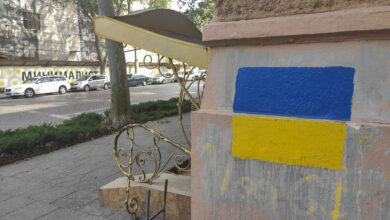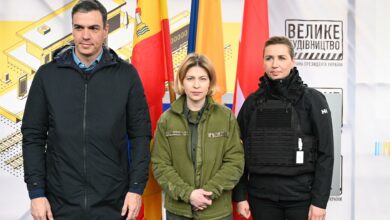Lviv center for the internally displaced: a home away from home

By Rostyslav Averchuk
Lviv, Ukraine, Oct 26 (EFE).- Displaced residents of Mariupol face the need to overcome psychological trauma and build their lives from scratch, away from home.
In Lviv, in western Ukraine, they rely on the help of the locals and mutual support, while believing they will eventually be able to return to their city, in the southeast.
An image of an anchor, painted in the Ukrainian flag’s blue and yellow colors, is the central element of a sign which directs people to the ‘I am Mariupol’ center of assistance for the internally displaced residents of the port city. which lost most of its population during a three-month siege by the Russian army.
Inside, the main room is filled with visitors while a kid plays in the toy corner.
The head of the center Andriy Vasylenko explains in an interview with Efe that they had to stay closed during the morning and early afternoon because of an air-raid alarm.
The center’s employees, most of them from Mariupol, are there to help the refugees with a number of pressing issues.
“Finding accommodation, finding work, paying taxes, restoring documents, everything has been a challenge,” Vasylenko tells Efe.
He underlines that the center, which is financed by Mariupol’s city budget, has received the help both from local authorities and regular residents since the very first day it opened, earlier this year in July.
He says that roughly 3,100 displaced people from Mariupol have already signed in. With most of them losing everything they had, they now depend on the help they get from humanitarian foundations and locals, ranging from food packages to clothes and wheelchairs for the disabled.
They also come here to regain the feeling of having a home as well as to receive psychological support.
Before starting the interview with Efe, the center’s psychologist Emilia Khutkovska — also a victim of forced displacement from Kherson — speaks briefly to a visibly distressed visitor at the entrance of the center and then hugs her firmly for a moment.
Khutkovska says that asking for help is often the most difficult and important step.
She explains that after having to watch how their hometown turned into “a ghost city” the residents of Mariupol experience post-traumatic disorders, anxiety and severe depression,
Recently, she has also seen many children with similar symptoms.
“A girl who came today has lost appetite, doesn’t smile and says she keeps seeing the destroyed building of the theatre (bombed by Russian forces on March 16 with roughly one thousand people inside).
“When asked if she ever feels well, the girl replied: ‘when all the family is together’,” Khutkovska tells Efe, before adding that the girl’s father is fighting on the frontline.
The center tries to help children and adults find some relief by learning new skills, discovering the city of Lviv or interacting with animals.
Musician Andriy Saravas, also a displaced resident of Mariupol, regularly holds guitar classes for children.
“These children left guitars and much of what they had behind, so we use musical instruments that were gifted by kind people”, says Saravas.





